- Home
- Andrzej Sapkowski
The Tower of Swallows
The Tower of Swallows Read online
orbitbooks.net
orbitshortfiction.com
To Dun Dâre they came at dead of night
For to seek the witcher maid
They ringed the hamlet from all sides
And sealed it with a barricade
Seize her they would in perfidy
But their plans were all in vain
Ere the sun arose on the frozen road
Three dozen brigands lay slain
A beggar’s song about the frightful massacre which took place in Dun Dâre on Samhain Eve
‘I can give you everything you desire,’ said the fortune-teller. ‘Riches, power and influence, fame and a long and happy life. Choose.’
‘I wish for neither riches nor fame, neither power nor influence,’ rejoined the witcher girl. ‘I wish for a horse, as black and swift as a nightly gale. I wish for a sword, as bright and keen as a moonbeam. I wish to overstride the world on my black horse through the black night. I wish to smite the forces of Evil and Darkness with my luminous blade. This I would have.’
‘I shall give you a horse, blacker than the night and fleeter than a nightly gale,’ vowed the fortune-teller. ‘I shall give you a sword, brighter and keener than a moonbeam. But you demand much, witcher girl, thus you must pay me dearly.’
‘With what? For I have nothing.’
‘With your blood.’
Flourens Delannoy, Fairy Tales and Stories
CHAPTER ONE
As is generally known, the Universe–like life–describes a wheel. A wheel on whose rim eight magical points are etched, making a complete turn; the annual cycle. These points, lying on the rim in pairs directly opposite each other, include Imbolc, or Budding; Lughnasadh, or Mellowing; Beltane, or Blooming; and Samhain, or Dying. Also marked on the wheel are the two Solstices, the winter one called Midinvaerne and Midaëte, for the summer. There are also the two Equinoxes–Birke, in spring, and Velen, in autumn. These dates divide the circle into eight parts–and so in the elven calendar the year is also divided up like that.
When they landed on the beaches in the vicinity of the Yaruga and the Pontar, people brought with them their own calendar, based on the moon, which divided the year into twelve months, giving the farmer’s annual working cycle–from the beginning, with the markers in January, until the end, when the frost turns the sod into a hard lump. But although people divided up the year and reckoned dates differently, they accepted the elven wheel and the eight points around its rim. Adopted from the elven calendar, Imbolc and Lughnasadh, Samhain and Beltane, both Solstices and both Equinoxes became important holidays, sacred tides for human folk. They stood out from the other dates as a lone tree stands out in a meadow.
Those dates are also set apart by magic.
It was not–and is not–a secret that the eight dates are days and nights during which the enchanted aura is greatly intensified. No longer is anyone astonished by the magical phenomena and mysterious occurrences that accompany the eight dates, in particular the Equinoxes and Solstices. Everyone is now accustomed to such phenomena and they seldom evoke a great sensation.
But that year it was different.
That year people had, as usual, celebrated the autumnal Equinox with a solemn family meal, during which all the kinds of fruits from that year’s harvest had to be arrayed on the table, even if only a little of each. Custom dictated it. Having eaten and given thanks to the goddess Melitele for the harvest, the people retired for the night. And then the nightmare began.
Just before midnight a frightful storm got up and a hellish gale blew, in which a ghastly howling, screaming and wailing were heard above the rustling of trees being bent almost to the ground, the creaking of rafters and the banging of shutters. The clouds driven across the sky assumed outlandish shapes, among which the most common were silhouettes of galloping horses and unicorns. The gale did not abate for a good hour, and in the sudden silence that followed it the night came alive with the trilling and whirring of the wings of hundreds of goatsucker nightjars, those mysterious fowl which–according to folk tales–gather together to sing a demonic death knell over a dying person. This time the chorus of nightjars was as mighty and loud as if the entire world were about to expire.
The nightjars sang their death knell in clamorous voices while the horizon became shrouded in clouds, quenching the remains of the moonlight. At that moment sounded the howl of the fell beann’shie, the harbinger of imminent and violent death, and across the black sky galloped the Wild Hunt–a procession of fiery-eyed phantoms on skeleton horses, their tattered cloaks and standards fluttering behind them. So it was every few years. The Wild Hunt gathered its harvest, but it had not been this terrible for decades–in Novigrad alone over two dozen people went missing without a trace.
After the Hunt had galloped by and the clouds had dispersed, people saw the moon–on the wane, as was customary during the Equinox. But that night the moon was the colour of blood.
Simple folk had many explanations for these equinoctial phenomena, which tended to differ considerably from each other according to the specifics of local demonology. Astrologers, druids and sorcerers also had their explanations, but they were in the main erroneous and cobbled together haphazardly. Few, very few, people were able to connect the phenomena to real facts.
On the Isles of Skellige, for example, a few very superstitious people saw in the curious events a harbinger of Tedd Deireadh, the end of the world, preceded by Ragh nar Roog, the last battle between Light and Darkness. The violent storm which rocked the Islands on the night of the Autumn Equinox was regarded by the superstitious as a wave pushed by the prow of the fearsome Naglfar of Morhögg, a longship with sides built of dead men’s fingernails and toenails, bearing an army of spectres and demons of Chaos. More enlightened or better informed people, however, linked the turmoil of the heavens with the evil witch Yennefer, and her dreadful death. Others yet–who were even better informed–saw in the churned-up sea a sign that someone was dying, someone in whose veins flowed the blood of the kings of Skellige and Cintra.
The world over, the autumn Equinox was a night of spectres, nightmares and apparitions, a night of sudden, suffocating awakenings, fraught with menace, among sweat-soaked and rumpled sheets. Neither did the most illustrious escape the apparitions and awakenings; Emperor Emhyr var Emreis awoke with a cry in the Golden Towers in Nilfgaard. In the North, in Lan Exeter, King Esterad Thyssen leaped from his bed, waking his spouse, Queen Zuleyka. In Tretogor, the arch-spy Dijkstra leaped up and reached for his dagger, waking the wife of the state treasurer. In the huge castle of Montecalvo the sorceress Philippa Eilhart leaped from damask sheets, without waking the Comte de Noailles’ wife. The dwarf Yarpen Zigrin in Mahakam, the old witcher Vesemir in the mountain stronghold of Kaer Morhen, the bank clerk Fabio Sachs in the city of Gors Velen and Yarl Crach an Craite on board the longboat Ringhorn all awoke more or less abruptly. The sorceress Fringilla Vigo came awake in Beauclair Castle, as did the priestess Sigrdrifa of the temple of the goddess Freyja on the island of Hindarsfjall. Daniel Etcheverry, Count of Garramone, awoke in the besieged fortress of Maribor. As did Zyvik, decurion of the Dun Banner, in Ban Gleann fort. And the merchant Dominik Bombastus Houvenaghel in the town of Claremont. And many, many others.
Few, though, were capable of connecting all those occurrences and phenomena with an actual, specific fact. Or a specific person. A stroke of luck meant that three such people were spending the night of the autumn Equinox under one roof. They were in the temple of the goddess Melitele in Ellander.
‘Lich fowl…’ groaned the scribe Jarre, staring into the darkness filling the temple grounds. ‘There must be thousands of them, whole flocks. They’re crying over someone’s death. Over her death… She
’s dying…’
‘Don’t talk nonsense!’ Triss Merigold spun around, raised a clenched fist, and, for a moment, looked as though she would shove the boy or strike him in the chest. ‘Do you believe in foolish superstitions? September is coming to an end and the nightjars are gathering before taking flight! It’s quite natural!’
‘She’s dying…’
‘No one is dying!’ screamed the sorceress, paling in fury. ‘No one, do you understand? Stop talking nonsense!’
Several young female adepts appeared in the library corridor, aroused by the nocturnal alarm. Their countenances were grave and ashen.
‘Jarre.’ Triss had calmed down. She placed a hand on the boy’s shoulder and squeezed hard. ‘You’re the only man in the temple. We’re all watching you, looking for support and succour from you. You must not fear, you must not panic. Master yourself. Do not let us down.’
Jarre took a deep breath, trying to calm the trembling of his hands and lips.
‘It is not fear…’ he whispered, avoiding the sorceress’s gaze. ‘I’m not afraid, I’m troubled! About her. I saw her in a dream.’
‘I saw her too.’ Triss pursed her lips. ‘We had the same dream, you, I and Nenneke. Not a word about it.’
‘Blood on her face… So much blood—’
‘Be silent, I say. Nenneke approaches.’
The high priestess joined them. She looked weary. She shook her head in answer to Triss’s wordless question. Seeing that Jarre had opened his mouth, she forestalled him.
‘Nothing, sadly. Almost all the girls awoke when the Wild Hunt flew over the temple, but none of them had a vision. Not even one as hazy as ours. Go to bed, lad, you cannot help. Back to the dormitory, girls.’
She rubbed her face and eyes with both hands.
‘Oh… The Equinox! This accursed night… Go to bed, Triss. We can do nothing.’
The sorceress clenched her fists. ‘This helplessness is driving me to insanity. The thought that somewhere she is suffering, bleeding, that she’s in peril… If I only knew what to do, dammit!’
Nenneke, high priestess of the temple of Melitele, turned around.
‘Have you tried praying?’
In the South, far beyond the mountains of Amell, in Ebbing, in the land called Pereplut, on the vast marshes crisscrossed by the rivers Velda, Lete and Arete, in a place eight hundred miles as the crow flies from the city of Ellander and the temple of Melitele, a nightmare jerked the old hermit Vysogota from sleep. Once awake, Vysogota could not for the life of him recall his dream, but a weird unease prevented him from falling asleep again.
‘It’s cold, cold, cold,’ said Vysogota to himself, as he tramped along a path among the reeds. ‘It’s cold, cold, brrr.’
Yet another trap was empty. Not a single muskrat. A most unsuccessful night. Vysogota cleaned sludge and duckweed from the trap, muttering curses and sniffing through his frozen nostrils.
‘It’s cold, brrr, hooeee!’ he said, walking towards the edge of the swamp. ‘And September not yet over! It’s but four days after the Equinox! Ah, I don’t recall such chills at the end of September, not for as long as I’ve lived. And I’ve lived a long time!’
The next–and penultimate–trap was also empty. Vysogota didn’t even feel like cursing.
‘There’s no doubt,’ he wittered on, as he walked, ‘that the climate grows colder with every passing year. And now it looks as though the cooling will progress apace. Ha, the elves predicted that long since, but who believed in elven forecasts?’
Once again small wings whirred, and incredibly swift grey shapes flashed by above the old man’s head. Once again the fog over the swamps echoed with the wild, intermittent churring of the goatsucker nightjars and the rapid slapping of their wings. Vysogota paid no attention to the birds. He was not superstitious, and there were always plenty of lich fowl on the bogs, particularly at dawn. The air was so thick with them he feared they would collide with him. No, perhaps there weren’t always as many as there were today, perhaps they didn’t always call quite so bloodcurdlingly… Ah well, he thought, latterly nature has been playing queer pranks, and it’s been one oddity after another, each one queerer than the last.
He was just removing the last–empty–trap from the water when he heard the neighing of a horse. The nightjars suddenly all fell silent.
There were hummocks on the swamps of Pereplut: dry, raised places, with river birch, alder, dogwood and blackthorn growing on them. Most of the hummocks were surrounded so completely by the bogs that it was impossible for a horse or a rider who didn’t know the paths to reach them. But the neighing–Vysogota heard it once again–was coming from one of them hillocks.
Curiosity got the better of caution.
Vysogota was no expert on horses and their breeds, but he was an aesthete, and was able to recognise and appreciate beauty. And the black horse he saw framed against the birch trunks, with its coat gleaming like anthracite, was extraordinarily beautiful. It was the sheer quintessence of beauty. It was so beautiful it seemed unreal.
But it was real. And quite really caught in a trap, its reins and bridle entangled in the blood-red, clinging branches of a dogwood bush. When Vysogota went closer, the horse put its ears back and stamped so hard the ground shuddered, jerking its shapely head and whirling around. Now it was clear it was a mare. There was something else. Something that made Vysogota’s heart pound frantically, and invisible pincers of adrenaline tighten around his throat.
Behind the horse, in a shallow hollow, lay a body.
Vysogota dropped his sack on the ground. And was ashamed of his first thought; which was to turn tail and run. He went closer, exercising caution, because the black mare was stamping her hooves, flattening her ears, baring her teeth on the bit and just waiting for the opportunity to bite or kick him.
The corpse was that of a teenage boy. He was lying face down, with one arm pinned by his trunk, the other extended to one side with its fingers digging into the sand. The boy was wearing a short suede jacket, tight leather britches and soft knee-high elven boots with buckles.
Vysogota leaned over. And just then the corpse gave a loud groan. The black mare gave a long-drawn-out neigh and thumped its hooves against the ground.
The hermit knelt down and cautiously turned over the injured boy. He involuntarily drew back and hissed at the sight of the ghastly mask of dirt and congealed blood where the boy’s face should have been. He delicately picked moss, leaves and sand from the spittle- and mucous-covered lips, and tried to pull away the matted hair stuck with blood to his cheek. The injured boy moaned softly and tensed up. And began to shake. Vysogota peeled the hair away from the boy’s face.
‘A girl,’ he said aloud, unable to believe what was right in front of him. ‘It’s a girl.’
That day, had someone quietly crept up at dusk to the remote cottage in the midst of the swamp with its sunken, moss-grown thatched roof, had they peered through the slits in the shutters, in the weak glow of tallow candles, they would have seen a teenage girl with her head thickly bound in bandages, lying with almost corpse-like motionlessness, on a pallet covered in animal skins. They would also have seen an old man with a grey, wedge-shaped beard and long white hair, which fell down onto his shoulders and back from the edge of a broad bald patch that extended from his soiled forehead far beyond his crown. They would have noticed the old man lighting another tallow candle, placing an hourglass on the table, sharpening a quill and hunching over a leaf of parchment. Seen him ponder and mumble something to himself, keeping a close watch on the girl lying on the pallet.
But it would not have been possible. No one could have seen it. The cottage of the hermit Vysogota was well concealed amidst the marshes, in a wilderness permanently shrouded in mist, where no one dared to venture.
‘We shall note down as follows,’ Vysogota dipped his quill in the ink, ‘Third hour after my intervention. Diagnosis: vulnus incisivum, an open wound, dealt with great force using an unidentified sharp instrument, p
robably a curved blade. It encompasses the left part of the face, beginning in the infraorbital region, running across the cheek and extending as far as the parotid plexus and masseter muscle. The wound is deepest–reaching the periosteum–in the initial part beneath the orbit on the zygomatic bone. Probable length of time from when the wound was sustained to when it was first dressed: ten hours.’
The quill scratched on the parchment, but the scratching didn’t last longer than a few moments. Or lines. Vysogota did not find everything he said to himself worthy of being written down.
‘Returning to the dressing of the wound,’ the old man began again, staring at the flickering and smoking candle flame, ‘let us write as follows: I did not excise the edges of the cut, I limited myself to the removal of shreds of dead tissue and coagulated blood. I bathed the wound with willow bark extract. I removed dirt and foreign bodies. I put in sutures. Hemp sutures. Let it be written that I did not have any other kinds of thread at my disposal. I used a poultice of wolfsbane and applied a formed muslin dressing.’
A mouse scampered out into the middle of the chamber. Vysogota threw it a piece of bread. The girl on the pallet breathed restlessly and groaned in her sleep.
‘Eighth hour following my intervention. Condition of the patient–unchanged. Condition of the doctor… I mean my condition… has improved, since I have enjoyed a little sleep… I can continue my notes. It behoves me to commit onto these leaves some information about my patient. For posterity. Assuming that posterity reaches these swamps before everything decays and crumbles into dust.’
Vysogota sighed heavily, dipped his quill and wiped it on the edge of his inkwell.
‘As far as the patient is concerned,’ he muttered, ‘let the following be noted down. Age, I would say, around sixteen. Tall, strikingly slim build, but by no means puny, no indication of undernourishment. Musculature and physical construction rather typical for a young elf-woman, but no mixed-blood traits found… Can’t be more than one eighth elven. A smaller proportion of elven blood may, of course, not leave any traces.’

 something ends something begins sapkowski
something ends something begins sapkowski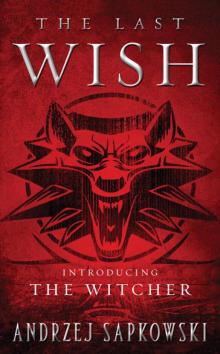 The Last Wish
The Last Wish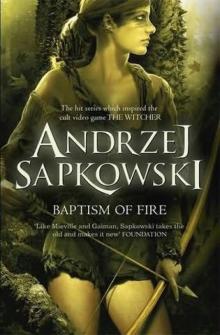 Baptism of Fire
Baptism of Fire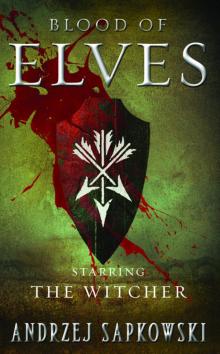 Blood of Elves
Blood of Elves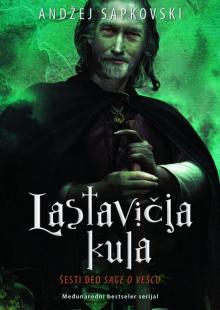 Lastavičja Kula
Lastavičja Kula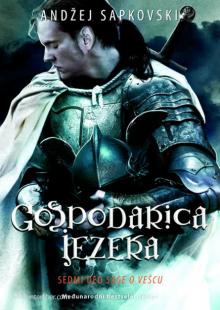 Gospodarica Jezera
Gospodarica Jezera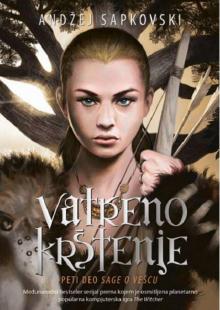 Vatreno Krštenje
Vatreno Krštenje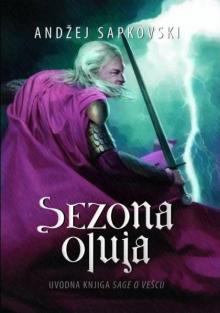 Sezona Oluja
Sezona Oluja Lady of the Lake
Lady of the Lake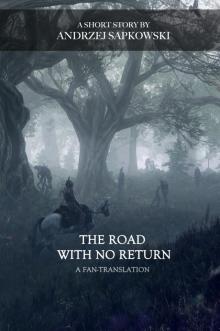 The Road With No Return
The Road With No Return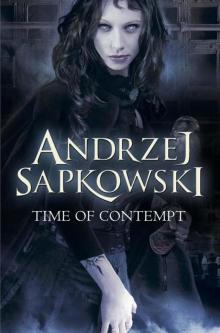 Time of Contempt
Time of Contempt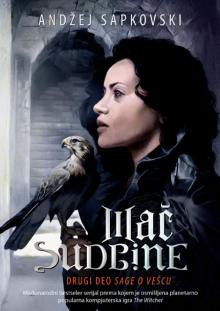 Mač Sudbine
Mač Sudbine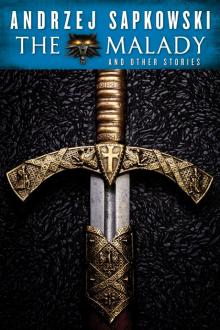 The Malady and Other Stories: An Andrzej Sapkowski Sampler
The Malady and Other Stories: An Andrzej Sapkowski Sampler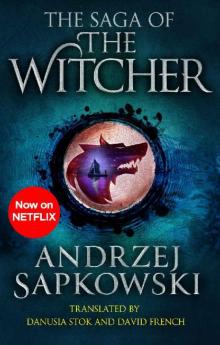 The Saga of the Witcher
The Saga of the Witcher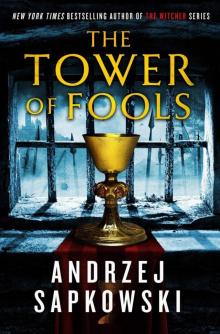 The Tower of Fools
The Tower of Fools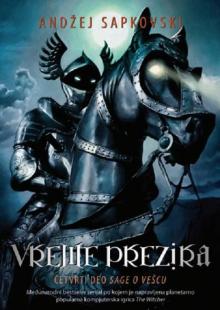 Vreme Prezira
Vreme Prezira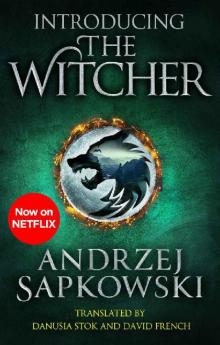 Introducing the Witcher
Introducing the Witcher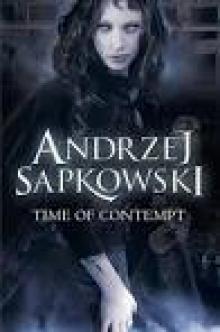 Stephen Hulin
Stephen Hulin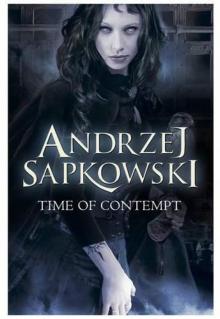 The Time of Contempt
The Time of Contempt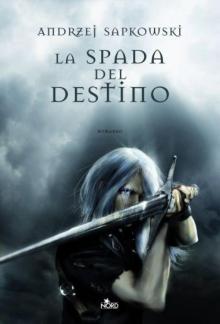 The Sword of Destiny
The Sword of Destiny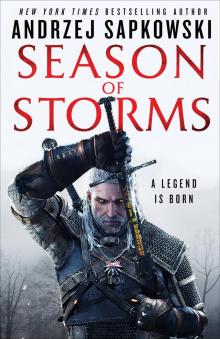 Season of Storms
Season of Storms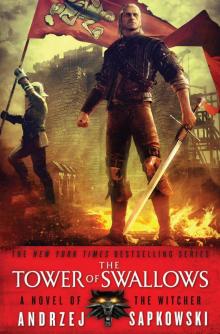 The Tower of Swallows
The Tower of Swallows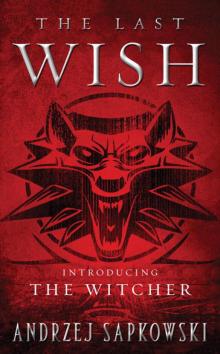 The Last Wish: Introducing The Witcher
The Last Wish: Introducing The Witcher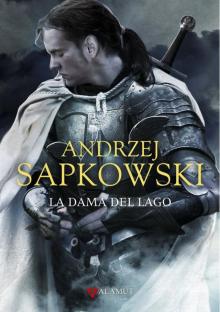 The Lady of the Lake
The Lady of the Lake